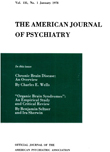NARCOANALYSIS AND CRIMINAL LAW
Abstract
Criminal suspects, while under the influence of barbiturate drugs, may deliberately withhold information, persist in giving untruthful answers, or falsely confess to crimes they have not committed. Narcoanalysis is of doubtful value when used for the purpose of obtaining confessions to crimes. For ethical reasons the psychiatrist is advised against performing narcoanalysis when the examination is requested as an aid to criminal investigation.
Narcoanalysis is sometimes of value in the psychiatric examination of criminal suspects who have entered a plea of insanity. Information so obtained should not be used as evidence in determining the innocence or guilt of the accused person, unless it is with his consent and his attorney's approval. Indications and contraindications for narcoanalysis are described, as well as some criteria for evaluating the reliability of the individual examination.
Access content
To read the fulltext, please use one of the options below to sign in or purchase access.- Personal login
- Institutional Login
- Sign in via OpenAthens
- Register for access
-
Please login/register if you wish to pair your device and check access availability.
Not a subscriber?
PsychiatryOnline subscription options offer access to the DSM-5 library, books, journals, CME, and patient resources. This all-in-one virtual library provides psychiatrists and mental health professionals with key resources for diagnosis, treatment, research, and professional development.
Need more help? PsychiatryOnline Customer Service may be reached by emailing [email protected] or by calling 800-368-5777 (in the U.S.) or 703-907-7322 (outside the U.S.).



